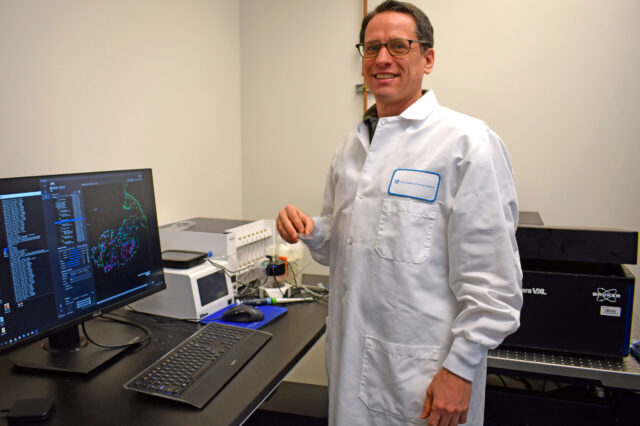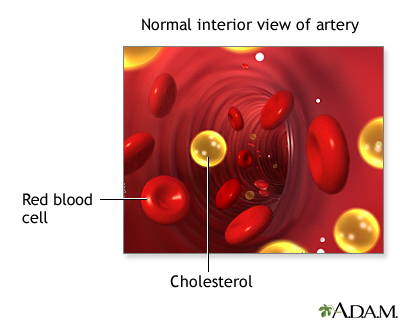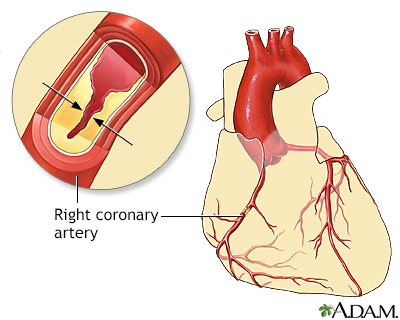Definition
Cholesterol is a fat (also called a lipid) that your body needs to work properly. Too much bad cholesterol can increase your chance of getting heart disease, stroke, and other problems.
The medical term for high blood cholesterol is lipid disorder, hyperlipidemia, or hypercholesterolemia.
Alternative Names
Cholesterol - high; Lipid disorders; Hyperlipoproteinemia; Hyperlipidemia; Dyslipidemia; Hypercholesterolemia
Causes
There are many types of cholesterol. The ones talked about most are:
- Total cholesterol -- all the cholesterols combined
- High density lipoprotein (HDL) cholesterol -- often called "good" cholesterol
- Low density lipoprotein (LDL) cholesterol -- often called "bad" cholesterol
For many people, abnormal cholesterol levels are partly due to an unhealthy lifestyle. This often includes eating a diet that is high in fat. Other lifestyle factors are:
- Being overweight
- Lack of exercise
Some health conditions can also lead to abnormal cholesterol, including:
- Diabetes
- Kidney disease
- Polycystic ovary syndrome
- Pregnancy and other conditions that increase levels of female hormones
- Underactive thyroid gland
Medicines such as certain birth control pills, diuretics (water pills), beta-blockers, and some medicines used to treat depression may also raise cholesterol levels. Several disorders that are passed down through families lead to abnormal cholesterol and triglyceride levels. They include:
- Familial combined hyperlipidemia
- Familial dysbetalipoproteinemia
- Familial hypercholesterolemia
- Familial hypertriglyceridemia
Smoking does not cause higher cholesterol levels, but it can reduce your HDL (good) cholesterol.
A cholesterol test is done to diagnose a lipid disorder. Different experts recommend different starting ages for adults.
- Recommended starting ages are between 20 to 35 for men and 20 to 45 for women.
- Adults with normal cholesterol levels do not need to have the test repeated for 5 years.
- Repeat testing sooner if changes occur in lifestyle (including weight gain and diet).
- Adults with a history of elevated cholesterol, diabetes, kidney problems, heart disease, and other conditions require more frequent testing.
It is important to work with your health care provider to set your cholesterol goals. Newer guidelines steer doctors away from targeting specific levels of cholesterol. Instead, they recommend different medicines and doses depending on a person's history and risk factor profile. These guidelines change from time to time as more information from research studies becomes available.
General targets are:
- LDL: 70 to 130 mg/dL (lower numbers are better)
- HDL: More than 50 mg/dL (higher numbers are better)
- Total cholesterol: Less than 200 mg/dL (lower numbers are better)
- Triglycerides: 10 to 150 mg/dL (lower numbers are better)
If your cholesterol results are abnormal, you may also have other tests such as:
- Blood sugar (glucose) test to look for diabetes
- Kidney function tests
- Thyroid function tests to look for an underactive thyroid gland
Treatment
Steps you can take to improve your cholesterol levels and to help prevent heart disease and a heart attack include:
- Quit smoking. This is the single biggest change you can make to reduce your risk of heart attack and stroke.
- Eat foods that are naturally low in fat. These include whole grains, fruits, and vegetables.
- Use low-fat toppings, sauces, and dressings.
- Avoid foods that are high in saturated fat.
-
Exercise regularly.
- Lose weight if you are overweight.
Your provider may want you to take medicine for your cholesterol if lifestyle changes do not work. This will depend on:
- Your age
- Whether or not you have heart disease, diabetes, or other blood flow problems
- Whether you smoke or are overweight
- Whether you have high blood pressure or diabetes
You are more likely to need medicine to lower your cholesterol:
- If you have heart disease or diabetes
- If you are at risk for heart disease (even if you do not yet have any heart problems)
- If your LDL cholesterol is 190 mg/dL or higher
Almost everyone else may get health benefits from LDL cholesterol that is lower than 160 to 190 mg/dL.
There are several types of drugs to help lower blood cholesterol levels. The drugs work in different ways. Statins are one kind of drug that lowers cholesterol and has been proven to reduce the chance of heart disease. Other drugs are available if your risk is high and statins do not lower your cholesterol levels enough. These include ezetimibe and PCSK9 inhibitors.
Outlook (Prognosis)
High cholesterol levels can lead to hardening of the arteries, also called atherosclerosis. This occurs when fat, cholesterol, and other substances build up in the walls of arteries and form hard structures called plaques.
Over time, these plaques can block the arteries and cause heart disease, stroke, and other symptoms or problems throughout the body.
Disorders that are passed down through families often lead to higher cholesterol levels that are harder to control.
References
Arnett DK, Blumenthal RS, Albert MA, et al. 2019 ACC/AHA Guideline on the primary prevention of cardiovascular disease: executive summary: a report of the American College of Cardiology/American Heart Association Task Force on Clinical Practice Guidelines. Circulation. 2019;140(11):e563-e595. PMID: 30879339. pubmed.ncbi.nlm.nih.gov/30879339/.
Genest J, Mora S, Libby P. Lipoprotein disorders and cardiovascular disease. In: Libby P, Bonow RO, Mann DL, Tomaselli GF, Bhatt DL, Solomon SD, eds. Braunwald's Heart Disease: A Textbook of Cardiovascular Medicine. 12th ed. Philadelphia, PA: Elsevier; 2022:chap 27.
Grundy SM, Stone NJ, Bailey AL, et al. 2018 AHA/ACC/AACVPR/AAPA/ABC/ACPM/ADA/AGS/APhA/ASPC/NLA/PCNA guideline on the management of blood cholesterol: executive summary; a report of the American College of Cardiology/American Heart Association Task Force on Clinical Practice Guidelines. J Am Coll Cardiol. 2019;73(24):3168-3209. PMID: 30423391 pubmed.ncbi.nlm.nih.gov/30423391/.
Robinson JG. Disorders of lipid metabolism. In: Goldman L, Schafer AI, eds. Goldman-Cecil Medicine. 26th ed. Philadelphia, PA: Elsevier; 2020:chap 195.
US Preventive Services Task Force final recommendation statement. Statin use for the primary prevention of cardiovascular disease in adults: preventive medication. www.uspreventiveservicestaskforce.org/uspstf/recommendation/statin-use-in-adults-preventive-medication. Updated August 23, 2022. Accessed January 6, 2023.
US Preventive Services Task Force; Bibbins-Domingo K, Grossman DC, Curry SJ, et al. Screening for lipid disorders in children and adolescents: US Preventive Services Task Force recommendation statement. JAMA. 2016;316(6):625-633. PMID: 27532917 pubmed.ncbi.nlm.nih.gov/27532917/.





